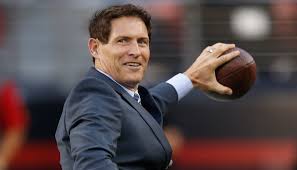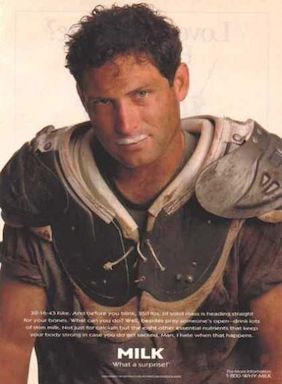Steve Young
Jon Steven Young (born October 11, 1961 in Salt Lake City, Utah), is best known as quarterback for the National Football League's San Francisco 49ers. He also played for the Tampa Bay Buccaneers and the Los Angeles Express of the now defunct United States Football League. He was named the Most Valuable Player of the NFL in 1992 and 1994, the MVP of Super Bowl XXIX, and was inducted into the Pro Football Hall of Fame in 2005, the first left-handed quarterback to be so honored. He is a three-time Super Bowl champion (XXIII, XXIV, XXIX). He holds the NFL record for highest career passer rating and won six NFL passing titles. Steve is a member of The Church of Jesus Christ of Latter-day Saints, and he was known for his exemplary conduct throughout his career. He is a descendant of early Church president Brigham Young.
Contents
Personal Life
Steve attended Greenwich High School in Greenwich, Connecticut, and was a multi-sport athlete. He went on to play for LaVell Edwards of Brigham Young University, and was a Heisman Trophy finalist. Steve's father was LeGrande "Grit" Young, who played football at BYU in the late 1950s. He led the school in scoring in 1955 and in rushing and total offense in 1959. Steve is married to the former Barbara Graham. They married on March 15, 2000, in a ceremony at the Kona Hawaii Temple in Kailua-Kona on the island of Hawaii. They have two sons and two daughters together.
Football Career
When Steve began to play for BYU, his speed overshadowed his passing ability. He was not originally considered for the quarterback position. He invested much effort in improving his passing ability to land the QB position. He "eventually succeeded record-setting Jim McMahon as the Cougars' starting QB. Young's senior season (1983) was spectacular. He passed for 3,902 yards and 33 touchdowns in the regular season, and his 71.3% completion percentage set an NCAA single-season record. He also added 544 yards rushing. With Young at quarterback, BYU set an NCAA record by averaging 584.2 yards of total offense per game, with 370.5 of those yards coming from Young's passing and rushing. The Cougars finished the year with an impressive 11–1 record; Young was named First Team All-American and finished second in voting for the Heisman Trophy (behind Nebraska running back Mike Rozier). Young's record breaking season was honored when he won the Davey O'Brien National Quarterback Award which recognizes the nation's best collegiate quarterback. Young capped his college career by scoring the game-winning touchdown in BYU's 21–17 victory over Missouri in the 1983 Holiday Bowl" (Wikipedia.org). Young finished his 3 seasons with 592 pass completions for 7,733 yards and 56 touchdowns, along with 1,048 rushing yards and 18 touchdowns on the ground. In 2001, he was enshrined in the College Football Hall of Fame.
Young signed a record 10-year, $40 million contract with the Los Angeles Express of the now-defunct United States Football League in 1984, making him the highest paid player in football history . However, the team never attracted a fan base, and the owner bankrupted. The league ceased operations in 1986 after losing most of its claims in an antitrust suit against the NFL. Young continues to receive his annuity as legally promised in his contract.
Young signed with the Tampa Bay Buccaneers in 1985 after being the first player selected in the year's supplemental draft. However, the Buccaneers posted 2–14 win-loss records in each of Young's two seasons with them, and Young's record as starter was 3–16. In his 19 games, he threw for only 11 touchdowns with 21 interceptions while completing fewer than 55% of his passes. Although his time in Tampa Bay was miserable, San Francisco 49ers coach Bill Walsh was impressed by Young's natural abilities and felt that his problems were due to the struggling Bucs organization (Wikipedia).
Young was traded to the San Francisco 49ers on April 24, 1987, to serve as a backup to Joe Montana. Young would spend the final 13 years of his career with the 49ers, a stint which would help him become one of the best quarterbacks in NFL history, and earn membership in the Pro Football Hall Of Fame in 2005. Steve Young played behind Montana his first several years, but shone as a backup. In 1989, he displayed his potential to become the team's starter in the future. Following an injury to Montana in the 1990 playoffs which forced him to miss the entire 1991 season, Young got his chance to lead the 49ers. However, he was also injured, and three quarterbacks -- Montana, Young, and Bono -- switched places as they became healthy. The 49ers lost ground. However, Young performed well enough during his first couple of seasons, that he was selected for the Pro Bowl.
Young's performance was so impressive that before the start of the 1993 season, San Francisco traded Montana to the Kansas City Chiefs. Young was now the 49ers' undisputed starter, and would remain so for the rest of his career. For the 1994 season, Steve Young was named the MVP of Super Bowl XXIX as the 49ers defeated the San Diego Chargers 49-26. In 1994 he threw for 3,969 yards, a then franchise record 35 touchdown passes with only 10 interceptions, completed an NFL record 70.28 percent of his passes, and broke Montana's single season mark with a then record 112.8 passer rating. He was named NFL MVP for the second time.
The 1999 season would turn out to be Steve Young's last. Young was plagued by concussions throughout his career. Officially, Young had suffered seven concussions. He was inducted into the Pro Football Hall of Fame in 2005, becoming the first left-handed quarterback to be so honored. A left-handed thrower, Young was famous for his ability to "scramble" away from the pass rush. He has the third-highest single-season passer rating at 112.8 (set in the 1994 season), next to Indianapolis Colts' Peyton Manning (121.1 QB rating in 2004), and New England Patriots' Tom Brady (117.2 QB rating in 2007). However, among quarterbacks with at least 1,500 passing attempts, Young's career passer rating of 96.8 is the highest of any quarterback in NFL history. The San Francisco 49ers had his #8 jersey retired during a halftime ceremony against the New England Patriots on October 5, 2008. He was the 11th player in team history to receive this honor.
At the end of the 2016 season, he ranked fifth all-time passer, and was ranked second highest amongst retired players. His forty-three career rushing touchdowns rank second among quarterbacks, and his 4, 239 rushing yards rank fourth all-time.
Professional Life
Steve earned his law degree from Brigham Young University in 1994, and after his football career ended, he has been active in many business ventures. He currently serves on the board of directors of Nutraceutical Corporation in Park City, Utah, and is co-chair with his wife in the Forever Young Foundation, which he founded in 1993 as a charitable organization. Forever Young serves children facing significant physical, emotional, and financial challenges by providing academic, athletic, and therapeutic opportunities otherwise unavailable to them.
Steve serves as a National Advisor to ASCEND: A Humanitarian Alliance. This non-profit organization plans expeditions to African and South American countries to provide life skills mentoring with sustainable solutions in education, enterprise, health and simple technology. He has been involved in business ventures which include a stint with private equity firm HGGC, which was founded by billionaire industrialist Jon M. Huntsman and former Bain Capital executive Robert C. Gay; and a co-founder of the private equity firm, Sorenson Capital, in Lehi, Utah. Moreover, he is a former director of Foundry Networks. He co-founded Northgate Capital.
Steve served as an analyst for ESPN, the cable channel dedicated to sports, from 2000 until June 2023 layoffs were announced.[1]
Announced in July 2023, Young will be an assistant coach for the Menlo School’s girls flag football team as the sport holds its inaugural high school season in California. His two daughters will play on the team.[2]
Autobiography
Steve's autobiography QB: My Life Behind the Spiral was published in 2016. According to the Deseret News, the book started out as a family history project.
- The idea came one day when Young's 10-year-old son recounted a story he'd heard at school involving his father and former San Francisco great Joe Montana. But the story wasn't true, Young said, and he realized there was a "ton" that his four children didn't know about him.
- That small episode sparked a long process that eventually led Young to connect with author Jeff Benedict, who then assisted the former Brigham Young University and NFL quarterback in writing and publishing a transparent and insightful 389-page narrative of his life.
- Young admitted he was a "reluctant author" and not interested in using his story to entertain others, but only to benefit his family. Twice he declined to publish the manuscript before trusted friends persuaded him to just do it.
"I was really doing it to inform the children of what happened to dad. You are reading what I wanted my kids to know," Young said in a telephone interview with the Deseret News.[3]
In his book he revealed his battle with anxiety. “As a kid, I was fearless during the day,” Young said. “But at nighttime, I needed to be home. People would say, ‘Hey, sleep over Eddie’s house.’ ‘No.’ I don’t want to do that. I didn’t know what that was. But as I learned in my 30s, it’s a genetic thing. It’s sprinkled all throughout my mom’s family.” [4] Young eventually saw a psychiatrist, who diagnosed a fiendish form of separation anxiety-turned-pre-performance anxiety buried in the roots of the family tree. He eventually overcame the disorder.
Acting Career, Ads, and 60 Minutes
Young has both performed dramatic roles and appeared as himself in a limited acting career. He appeared in one episode of Frasier and one episode of Lois & Clark: The New Adventures of Superman. He made a guest appearance as himself in the Dharma & Greg episode "Are You Ready for Some Football?" and he also appeared as himself in an episode of Beverly Hills, 90210 and in season 8 of the NBC comedy series Wings in the episode "Just Call Me Angel". He also made cameo appearances in the Latter-day Saint comedy The Singles Ward (2002) and in a season 5 episode of BYUtv's Studio C (2014).
- When Young was in high school, he made a major decision that served him the rest of his life.
- The first time he showed up for a party, his teammates took him to the refrigerator and opened the door to show him a bottle of milk. "That's for you, Young," one of them said.
- "I laughed. So did they. It became standard procedure for them to have milk on hand at every party I attended," Young wrote. "They never pressured me to drink. When my buddies held a beer-guzzling contest, I guzzled milk. It's the one contest I always lost. Apparently, it's a lot easier to guzzle beer than milk."
- For the rest of his life, whenever Young was in a setting with alcohol, he drank milk. When the ad agency for the "Got Milk?" campaign learned about Young choosing milk over beer, he became the first athlete to appear on a poster with a milk mustache, according to [his autobiography].[5]
Young was interviewed by Mike Wallace for the 1995 60 Minutes segment on the Church that featured President Gordon B. Hinckley.

